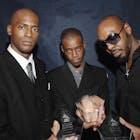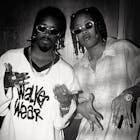The first indie label in the city, the imprint helped pave the way for Atlanta’s rap dominance—culturally, stylistically, and musically. Officially founded in 1995 by DJ Jelly, MC Assault, and Big Oomp (Korey Robinson), the label’s beginnings stretch back to the early 90s, when Atlanta mixtape legends, DJ Jelly and MC Assault, began flooding the city with their tapes.
“The mixtapes basically were like the radio because Hip-Hop wasn’t on the radio in the early 90s,” says Jelly, who also founded the influential crew, Southern Style DJs alongside MC Assault and DJ Montay, whose gone on to produce for Flo Rida (“Low”), Unk (“Walk It Out”) Ne-Yo (“Money Can’t Buy”), and Shawty Lo (“Foolish”), among others.
A St. Louis native, Jelly first came to Atlanta in 1989 to attend college at what’s now known as SCAD (the Savannah College of Art and Design), and he quickly found himself buried in Atlanta’s music scene. His first stint was as an intern at Bobby Brown’s studio, before he was fired. But by 1990, he’d been hired by DC of Tag Team at Atlanta’s flagship strip club, Magic City. He says that’s when his career really started. Not much later, a friend connected him with MC Assault, and together they started making mixtapes, and helping to break local and regional artists in the process.
“Our mixtapes had more of a production approach, what the kids call mash-ups, combining different genres and eras,” Jelly explains. “That’s how I was actually breaking music of the artists at the time— from OutKast to Triple Six Mafia.”
The tapes were so popular around the city, they drew the attention of Big Oomp, who offered to finance the pair’s venture. It didn’t take long for them to dominate, partially propelled by the influx of people who would head to Atlanta for Freaknik, where they’d flood people with their projects. But things really picked up with MC Assault suggested the the three of them start a label.
“The mixtape movement is really what influenced us to say, okay, since we’re breaking artists, why don’t we just get a couple of people who are around us and create this label?” Jelly remembers.
The label officially launched in 1995 with MC Assault’s project, Major Bank Streets of the ATL. However, it really gained its footing when Atlanta underground rap legend, Hitman Sammy Sam, joined the roster, bringing his charisma and street tales to the label, and giving it an air of authenticity that was specific to old Atlanta, before mass gentrification. Propelled by Atlanta classics like the gritty-bouncy, “Intoxicated” and the grimy-crunk “Ridin’ With Some Killaz,” Jelly says Sam’s presence “set the label off.” Even more, Sam’s music was a clearer indication for where Atlanta’s sound was headed. Sam arguably helped set the foundation for other rappers like Jeezy, T.I., Gucci Mane, and later Migos and Future, to follow.








